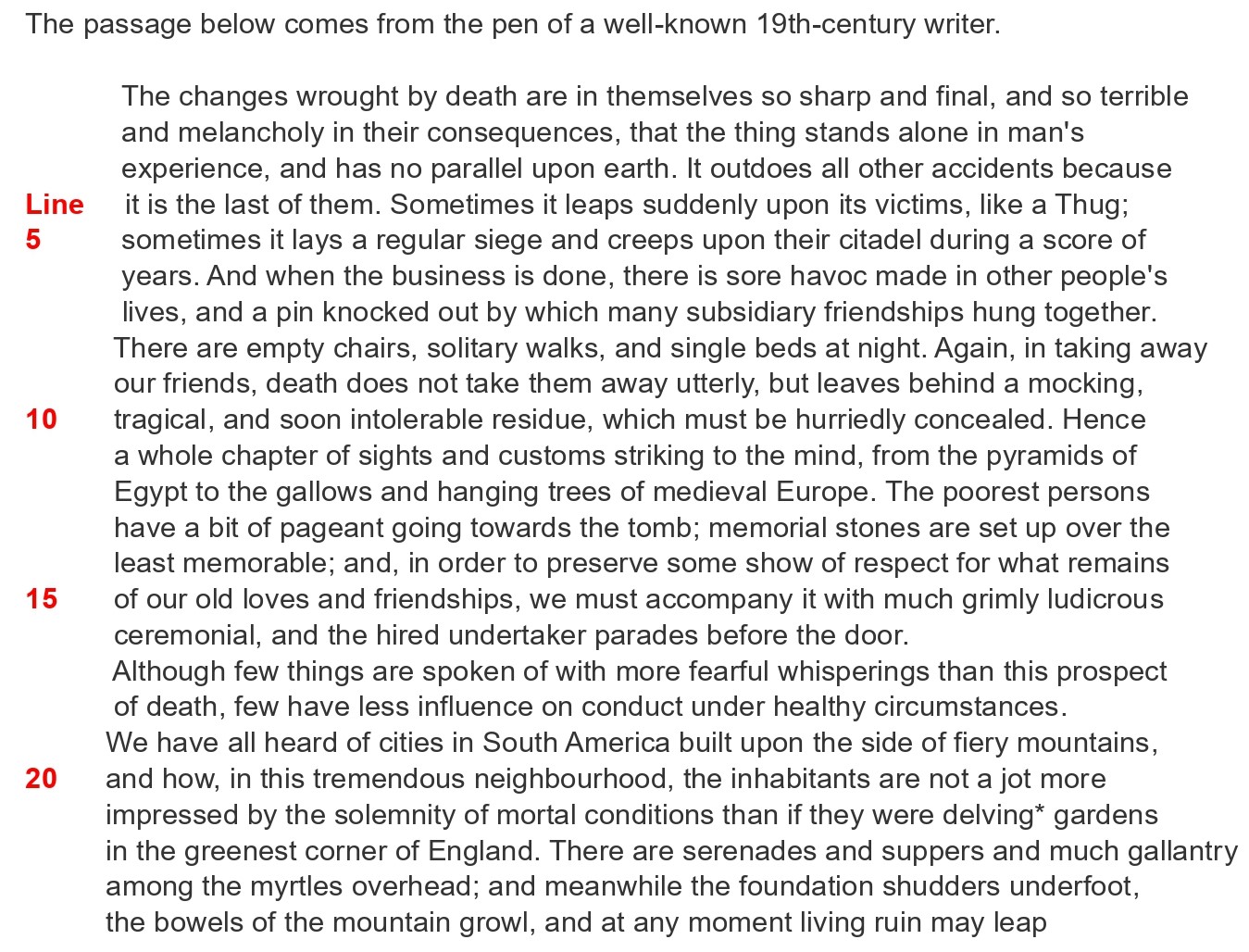
Both the expressions "death is not parallel" and "outdoes all other accidents" are meant to highlight how distinct death is. In other words, there is nothing quite like death among the events of life.
The "sore havoc" (line 6) that results from the loss of a friend or loved one is exemplified by the "empty chairs" and "solitary walks," among other things.
It uses the analogy "like a Thug." "It jumps unexpectedly upon its prey" and "it lays regular siege" are examples of personification. The word "occasionally" is used again to tie the first sentence of the two sentences together. An illustration of a metaphor would be the "pin," a tool used to hold things together. There is only dramatic irony, which occurs when a reader is more aware of a situation than a character in a novel.
The paragraph begins by discussing the gravity of death for both the departed and their survivors before moving on to discuss numerous side effects of passing away. The speaker laments that daily living offers little time for contemplation on what death means towards the conclusion of the paragraph.
The word "it" refers to death, also known as "the thing" in line 2.
As "residue" that serves as a reminder of death, the speaker mentions the Egyptian pyramids, gallows, and hanging trees. Also mentioned in line 8 are "empty chairs, solitary walks, and single beds at night," all of which serve to remind us of mortality on a regular basis.
It is a difficult sentence since it consists of a main clause and a subordinate clause. It explains a paradox of human nature: We fear death dreadfully but behave as if it doesn't exist. Parallel phrases in the sentence include "few things are spoken of" and "few have less effect." There is no analogy in the lines.
Advertisement
Serenades, supper, etc. are being contrasted with "delving gardens in England," according to the speaker. Both are instances of commonplace, everyday activities.
It is interesting to note the repeat of the s and m beginning consonants.
The phrases further the notion that people who live in cities perched on the sides of flaming mountains seem unconcerned about the deadly risks posed by volcanic eruptions.
The first sentence of the paragraph expresses a fundamental paradox: people are afraid of dying, but this fear has no bearing on their actions. The remainder of the paragraph is largely devoted to facts about the people who live in the towns that are situated on the "side of burning mountains." The irony is that the populace "is not a whit more moved by the solemnity of mortal conditions than if they were digging gardens..." In other words, despite the risks lying around every corner, they go about their daily lives, enjoying "serenades and suppers... etc." Which of the following best sums up the development of paragraph 2 (lines 17–33)?
The speaker makes a reference to umbrellas to imply that these married couples go to great lengths to shelter themselves from the rain but carelessly endanger themselves by eating "a bit of supper" on the edge of a burning mountain.
Hermits are lonely individuals who pray for their own souls and endure suffering in this life in exchange for a better one in the afterlife. The passage refers to "born-devils" who mindlessly bury their troubles and sorrows in alcohol, disregarding the consequences or long-term ramifications.
According to the speaker, a lot of the things we do in life put our organs' health, and by extension, our lives, in danger.
Advertisement
Lines 36–37's repeated phrase "traveling blindly and hastily" conjures up the frantic movement of a million universes. It is an analogy to compare the human body to a ship. What woman would ever be persuaded to marry, etc., is one of the rhetorical queries. (lines 45-46). "Ice" is used as a metaphor for life in the final sentence. The only thing missing is an anecdote; the speaker never provides a narrative.
The omnipresence of death is discussed in the first and third paragraphs. The speaker notes in the remaining portion of the chapter that despite death being a constant threat, people live their lives as if it were a phenomenon that has nothing to do with them. They essentially ignore it because they have no control over it.